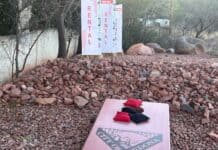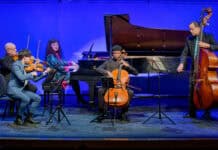For the past year, sleeping on public grounds within the city of Sedona has been legal as a result of a court ruling — but with an asterisk. In Martin v. City of Boise, an ordinance that criminalized people sleeping outside on public property was challenged on Eighth Amendment rules of cruel and unusual punishment. The U.S. Court of Appeals for the Ninth Circuit found in favor of the plaintiffs that it did violate their Eighth Amendment rights.
The city of Boise has appealed the decision to the U.S. Supreme Court, which will decide next month whether to hear the case. As a result of the appeals court’s decision, cities like Sedona must allow people to sleep in public places. Despite this ruling, however, cities are still allowed to distinguish between “sleeping” and camping on public property. Any kind of shelter like a tent or makeshift lean-to are still illegal under city code.
“But what you can’t criminalize are people sleeping, sitting or lying down on public property,” Sedona City Attorney Robert Pickels said. “Our ordinance is fine. We decided there wasn’t anything legally that needed to be changed.”
What is allowed is a sleeping bag, blanket and pillow but nothing else that resembles camping or cooking gear.
“Turning to the merits, the panel held that the Cruel and Unusual Punishments Clause of the Eighth Amendment precluded the enforcement of a statute prohibiting sleeping outside against homeless individuals with no access to alternative shelter,” the court ruling states. “The panel held that, as long as there is no option of sleeping indoors, the government cannot criminalize indigent, homeless people for sleeping outdoors, on public property, on the false premise they had a choice in the matter.”
When the Ninth Circuit renders an opinion, Pickels said Sedona is bound by that decision. If any city or state that is within the Ninth Circuit’s jurisdiction, like Arizona, wishes to challenges a decision, it would have to be done before the U.S. Supreme Court. Pickels said his office has received several questions from the police department in terms of when and where people are allowed to sleep. Calls have been dealt with on a case-by-case basis.
Prior to this decision, if someone was caught sleeping on city’s grounds they were often cited and told to move on. Sedona Parks and Recreation Manager Rachel Murdoch said people have slept behind the Sedona Posse Grounds Hub, on the stage at the pavilion, under the ramadas and even on playground equipment — all at Posse Grounds Park.
“We are doing our best to understand the ins and outs of the rules so that we can educate park-goers,” she said. “We do get asked, ‘Why are people sleeping on the playground?’ That happened during the week of summer camp and parents were asking and kids were uncomfortable because that is supposed to be their space.
“Everyone is being cautious to make sure no rules are broken and we do the right thing.” In regard to the person sleeping on the playground equipment during daytime, Pickels said while not illegal, the city does have the right to ask that person to go elsewhere in the park.
“That’s designated as a place for kids to play during the day,” he said.
Pickels said that leads into an area they’re still trying to decide: What constitutes sleep hours? That’s something he said the court didn’t address, so that leaves cities attempting to interpret that on their own without any direction from the court. Aside from the one incident, he said that’s not something the city has had to deal with.
Sunset Park, which clearly posts hours of operation, has not been an issue, Pickels said. In terms of the law, if the park is closed to everyone, then it’s not in any kind of violation of the court ruling. But if a park is closed solely to eliminate the possibility of people sleeping in it, then that is not allowed. Murdoch said park hours are posted at Posse Grounds but it’s not nearly as visible as the signs at Sunset Park. As for people parking their vehicles at Posse Grounds Park and sleeping in them, Pickels said regular parking regulations apply but it is not illegal.
The restrooms at Posse Grounds Park are unlocked during normal operating hours including at night during softball season and other special events.
Pickels said the court ruling does not require a city to keep restrooms open for the use of those sleeping on city grounds. That may lead to a health issue, he said, if people are urinating and defecating in the park.
“I think that’s an expected unintended consequence,” he said. “We would hope it wouldn’t be an issue but it may not be avoidable.”
This ruling only applies to public property. If someone is sleeping either in a vehicle or on the ground on private property, that’s still illegal.
But in terms of public property, what if someone chose to sleep at the City Hall complex, for example?
“The line of demarcation really revolves around disruption,” he said. “So if it’s something that’s going to disrupt regular activities or the orderly conduct of business, then that’s something we can still regulate. How we apply that practically, I’m really not sure because we haven’t had to. But I think it’s one of those things that we’ll know when we see it.”
Recently, this issue went beyond Posse Grounds to Uptown where individuals had created a makeshift lean-to and were told they had to take it down. But overall, Pickels said incidents citywide have been sporadic.
“I don’t believe this is a problem in Sedona,” he said. “There have been isolated instances where we’ve had to address some of these activities but I certainly wouldn’t characterize it as rising to the level of a problem. Some might but I don’t.
“But I qualify a problem by quantifying it. If it’s a high volume then it rises to the level of being problematic. These are isolated incidences. But the potential is certainly there.”
Ron Eland can be reached at 282-7795 ext 122 or by email at reland@larsonnewspapers.com






















